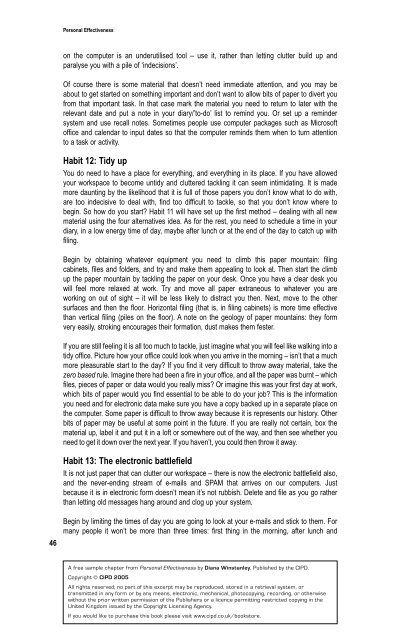Download - CIPD
Download - CIPD
Download - CIPD
Create successful ePaper yourself
Turn your PDF publications into a flip-book with our unique Google optimized e-Paper software.
Personal Effectivenesson the computer is an underutilised tool – use it, rather than letting clutter build up andparalyse you with a pile of ‘indecisions’.Of course there is some material that doesn’t need immediate attention, and you may beabout to get started on something important and don’t want to allow bits of paper to divert youfrom that important task. In that case mark the material you need to return to later with therelevant date and put a note in your diary/’to-do’ list to remind you. Or set up a remindersystem and use recall notes. Sometimes people use computer packages such as Microsoftoffice and calendar to input dates so that the computer reminds them when to turn attentionto a task or activity.Habit 12: Tidy upYou do need to have a place for everything, and everything in its place. If you have allowedyour workspace to become untidy and cluttered tackling it can seem intimidating. It is mademore daunting by the likelihood that it is full of those papers you don’t know what to do with,are too indecisive to deal with, find too difficult to tackle, so that you don’t know where tobegin. So how do you start? Habit 11 will have set up the first method – dealing with all newmaterial using the four alternatives idea. As for the rest, you need to schedule a time in yourdiary, in a low energy time of day, maybe after lunch or at the end of the day to catch up withfiling.Begin by obtaining whatever equipment you need to climb this paper mountain: filingcabinets, files and folders, and try and make them appealing to look at. Then start the climbup the paper mountain by tackling the paper on your desk. Once you have a clear desk youwill feel more relaxed at work. Try and move all paper extraneous to whatever you areworking on out of sight – it will be less likely to distract you then. Next, move to the othersurfaces and then the floor. Horizontal filing (that is, in filing cabinets) is more time effectivethan vertical filing (piles on the floor). A note on the geology of paper mountains: they formvery easily, stroking encourages their formation, dust makes them fester.If you are still feeling it is all too much to tackle, just imagine what you will feel like walking into atidy office. Picture how your office could look when you arrive in the morning – isn’t that a muchmore pleasurable start to the day? If you find it very difficult to throw away material, take thezero based rule. Imagine there had been a fire in your office, and all the paper was burnt – whichfiles, pieces of paper or data would you really miss? Or imagine this was your first day at work,which bits of paper would you find essential to be able to do your job? This is the informationyou need and for electronic data make sure you have a copy backed up in a separate place onthe computer. Some paper is difficult to throw away because it is represents our history. Otherbits of paper may be useful at some point in the future. If you are really not certain, box thematerial up, label it and put it in a loft or somewhere out of the way, and then see whether youneed to get it down over the next year. If you haven’t, you could then throw it away.Habit 13: The electronic battlefieldIt is not just paper that can clutter our workspace – there is now the electronic battlefield also,and the never-ending stream of e-mails and SPAM that arrives on our computers. Justbecause it is in electronic form doesn’t mean it’s not rubbish. Delete and file as you go ratherthan letting old messages hang around and clog up your system.46Begin by limiting the times of day you are going to look at your e-mails and stick to them. Formany people it won’t be more than three times: first thing in the morning, after lunch andA free sample chapter from Personal Effectiveness by Diana Winstanley. Published by the <strong>CIPD</strong>.Copyright © <strong>CIPD</strong> 2005All rights reserved; no part of this excerpt may be reproduced, stored in a retrieval system, ortransmitted in any form or by any means, electronic, mechanical, photocopying, recording, or otherwisewithout the prior written permission of the Publishers or a licence permitting restricted copying in theUnited Kingdom issued by the Copyright Licensing Agency.If you would like to purchase this book please visit www.cipd.co.uk/bookstore.

















